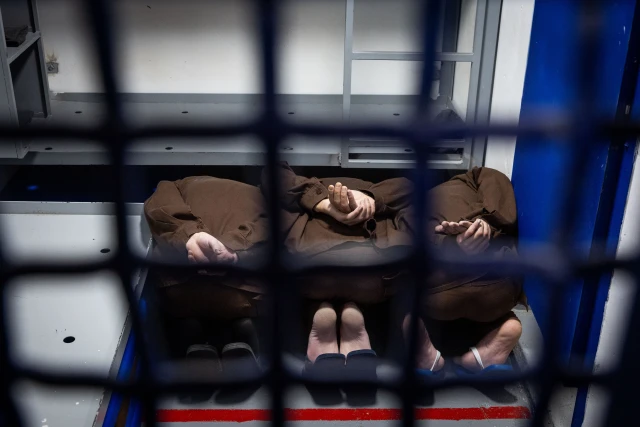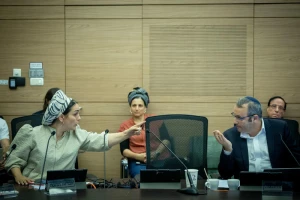IDF & Shin Bet don’t oppose death penalty for terrorists; Smotrich demands to include Jews who spy for Iran
Police announces latest indictment of Jewish Israeli over espionage for Iran

After passing a first out of three necessary readings in the Knesset last week, the “death penalty for terrorists” bill was discussed during a Cabinet meeting on Wednesday.
The discussion touched on several controversial aspects of the law.
While the security services indicated that there would be no objection on their part, the Israeli Medical Association (IMA) signaled that doctors would not want to take part in the practical implementation of the death penalty. At the same time, Israeli Finance Minister Bezalel Smotrich explicitly called for the measure to be extended to Jews who spy for the Iranian regime.
The bill was presented by National Security Minister Itamar Ben Gvir, who said it was meant “to create deterrence, prevent [terrorists] from continuing to carry out kidnappings, and bring justice – think about the murderers of the Fogel family.”
A representative from the Israel Defense Forces stated, “In the Chief of Staff’s view, there is no objection to a death penalty law for terrorists. This is our position and it is with the chief of staff’s approval. The army supports introducing judicial discretion and avoiding making it a mandatory sentence.”
Regional Cooperation Minister David Amsalem asked Shin Bet Director David Zini whether he thinks the law would increase deterrence. “Yes. Such a tool is highly deterrent,” Zini replied, according to Ynet News.
“I am not entering policy or legal considerations, but from our standpoint, it is a punishment that will deter.”
Amsalem then asked Zini whether the death penalty could lead to increased attempts at kidnapping Jews, rather than killing them. He responded, “They have already kidnapped before. The discussion is a moral one, but the law does bring deterrence.”
It is unclear whether Prime Minister Benjamin Netanyahu will ultimately support the implementation of the law, which is sure to invite international condemnation.
Dr. Yossi Wolfish, chair of the IMA's Medical Ethics Bureau, submitted a statement to the National Security Committee asserting that the organization “prohibits any participation of doctors in determining, preparing, or carrying out a death sentence – including assessing fitness, involvement in injecting substances, monitoring vital signs, or providing technical advice.”
He wrote that “the Israel Medical Association is committed to international conventions and fully adopts the principles of the World Medical Association, which holds that physician participation in executions is ethically unacceptable at any stage, including planning or guidance.”
Meanwhile, Government Secretary Yossi Fuchs stressed that from the government’s perspective, “The central question is whether it would be appropriate to introduce discretion and not make it a mandatory punishment.”
Ben Gvir argued that the death penalty must be a mandatory sentence “because of the Attorney General and the State Attorney’s Office. We all know they will never request the death penalty, and even if we instruct them to, they will tell us we cannot intervene in sentencing policy. I do not trust them.”
He also noted that the law would apply to “anyone acting against the revival of the Jewish people.”
Pointing to several recent incidents of Jewish Israelis spying for Iran, Finance Minister Smotrich argued that “a Jew who acts on behalf of Iran and against the State of Israel could [also] be executed.”
His position could provoke more discussions in the future, as some members of Ben Gvir’s Jewish Power party have argued that the law would not apply to Jews as they could not commit “terrorism” in the same sense.
According to Channel 12 News, in the past two months alone, Israel’s security services have carried out over 30 “interventions” connected to cases of Iranian intelligence trying to contact Israeli citizens, including warning conversations, interrogations and arrests.
Since the start of the war on Oct. 7, 2023, over 30 espionage cases have been discovered, leading to some 50 indictments.
The most recent case was revealed on Thursday, when the Shin Bet and the Israel Police announced the indictment of Rafael Reuveni, a 21-year-old Israeli citizen from Beersheva, who was arrested last month on suspicion of security offenses involving contact with Iranian intelligence operatives.
Reuveni had allegedly carried out various security-related missions at the direction of Iranian intelligence operatives in exchange for money, including sending photographs, hiding a phone and a cigarette box at designated locations, collecting a SIM card from a drop point, and transferring a concealed handgun to another location.

The All Israel News Staff is a team of journalists in Israel.
You might also like to read this:











